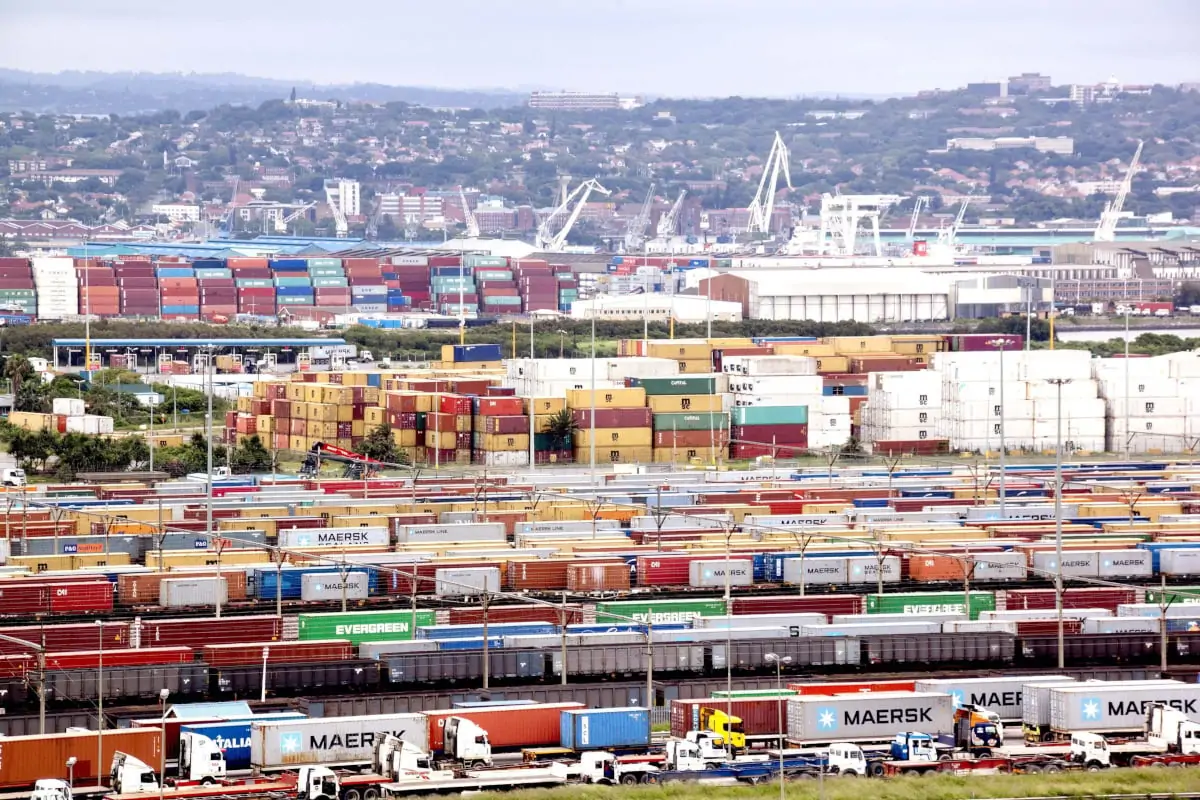
Amidst the crux of South Africa’s economic stability lies a profound crisis—the port congestion predicament intertwining with the collapse of Transnet, which now poses a grave threat to the nation’s financial health. As the country grapples with these challenges, the repercussions are dire, disrupting global trade routes and imperiling the South African economy.
Recent reports from the Sunday Times have unveiled the severity of the congestion crisis plaguing South Africa’s ports. Cargo ships are languishing for extensive periods, enduring waits as long as 19 days to unload shipments. This unprecedented backlog has forced major shipping lines to impose substantial “congestion surcharges.” Some have resorted to the costlier alternative of air freight, while others opt to bypass South African ports altogether.
In Cape Town’s port, cargo offloading delays have soared to 14 days, whereas, at the Durban Multipurpose Terminal, average delays have peaked at a staggering 365 hours (15 days). Container Terminal Pier 2 experienced even more staggering waiting times, reaching 457 hours, equivalent to a harrowing 19-day wait, according to a recent Transnet Port Terminals (TPT) national recovery update.
Disturbingly, approximately 70,000 shipping containers remain stranded on ships off the coast of Durban, further exacerbating the crisis. Major shipping lines such as Hapag-Lloyd, Maersk, MSC, and CMA CGM are imposing surcharges averaging around R8,000 per container, citing disruptions in South Africa that impede their global schedules. The cumulative cost for South African businesses due to the delay in Durban alone amounts to a staggering half a billion rand—approximately R560,000,000.
Moreover, these surcharges are poised to impact South African consumers directly, resulting in inflated prices for imported goods. To address this escalating issue, discussions have ensued between businesses, government representatives, and shipping line officials. Notable participants in these deliberations include prominent retailers like Mr Price, Toyota, and Defy.
The parlous state of local ports exacerbates this crisis, with Durban ranking 341st and Cape Town 344th out of 348 global ports surveyed in the World Bank’s container port performance index for 2022. This debilitating scenario has had colossal economic ramifications, with the collapse of Transnet—a linchpin of rail and port utility—accounting for a staggering loss of R1 billion per day in economic output. This equates to a detrimental 4.9% annual GDP loss, totaling R353 billion.
Rudi Dicks, a key figure in President Cyril Ramaphosa’s turnaround plan, emphasizes the gravity of this predicament. The government acknowledges the magnitude of the issue, acknowledging the urgent need for resolution, recognizing the transportation crisis as the primary obstacle to revitalizing South Africa’s ailing economy.
Addressing the port woes demands substantial funding, estimated at around R50 billion in capital expenditure, a sum currently absent from Transnet National Ports Authority’s budget. Urgency is paramount; delays in addressing this issue could exacerbate the economic fallout.
Andile Sangqu, Transnet’s chairperson, underscores the insurmountable debt burden of R135 billion plaguing the entity. With staggering interest costs of R13 billion, Transnet grapples with an unmanageable financial predicament, necessitating external aid for sustainability.
John Lawson, CEO of the Cape Chamber of Commerce & Industry, echoes the private sector’s call for immediate government intervention at national and provincial levels. This collective plea aims to alleviate port congestion and salvage the critical trade lifeline.
Recently proposed by Sangqu’s board, a turnaround plan suggests that the Treasury assume R61 billion of Transnet’s debt. To ensure Transnet’s viability, an additional R47 billion equity injection is deemed imperative.
The fate of South Africa’s economic resurgence is intricately tied to the swift resolution of these pressing issues. The government’s proactive intervention and collaborative efforts between public and private sectors are essential to mitigate the imminent risks and safeguard the nation’s economic future. Urgent measures and substantial investment in reviving ports and bolstering Transnet are crucial steps toward steering South Africa away from the brink of economic collapse.
This website uses cookies.